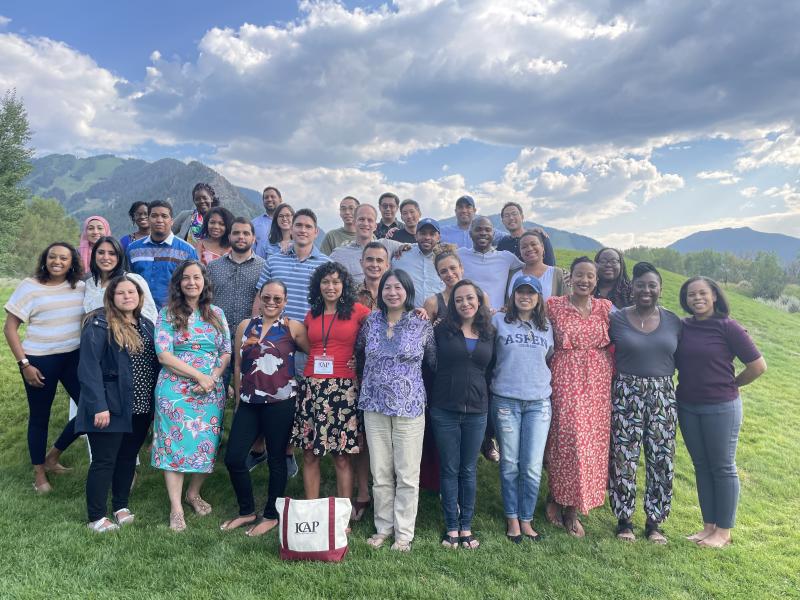ICAP Aspen: Forming Tomorrow’s Leaders in International Affairs
Every year, approximately thirty accomplished mid-career professionals gather at the Aspen Institute to discuss obstacles facing underrepresented communities pursuing careers in international relations. Nestled amongst the towering mountains of Aspen, the opportunity allows the participants to distance themselves physically and mentally from the high pressure of their jobs. Resources are shared, networks are expanded, and solutions are discussed throughout the week-long retreat. Founded in 1997, the International Career Advancement Program (ICAP) seeks “to improve the quality of the leadership of the United States in international affairs by helping to ensure that it reflects the full diversity of the U.S. population.”
Professor Tom Rowe, an Associate Professor of International Relations at the Korbel School, founded ICAP after identifying the lack of representation in leadership positions across the international relations sector. He understood that “U.S. leadership, which draws on the full range of talent and diversity of the U.S. population, will be more legitimate and will enhance the quality, effectiveness and creativity of U.S. participation in global affairs.” Due to Rowe’s affiliation with the University of Denver, the Korbel School has housed ICAP since its inception. This relationship allows for Korbel School faculty and students to participate in workshops, listen to talks from esteemed individuals, network across industries and sectors, and discuss relevant issues throughout the week.
At the latest conference, assistant professor Singumbe Muyeba and visiting teaching assistant professor Abigail Kabandula jointly spoke about U.S. foreign policy in the African continent. Speaking about the experience, Muyeba highlighted the network-building opportunity of ICAP, saying, “[ICAP] is a place where [young professionals] can actually connect and establish social networks that they can use as the source of support and also exchange ideas for how to navigate their international careers.” Along with the opportunity to establish a community, Muyeba positively highlighted how the length of ICAP provided time to establish deeper connections with other attendees. Kabandula also mentioned ICAP’s training on navigating the workforce. “The more people of color who are trained in high power politics, the more they can participate in issues that they do not have experience in.” She also emphasized the importance of the networking aspect, saying, “it is hard to get people like that in one place and bringing them to ICAP gives them the opportunity to take a step back from their work. It gives them an opportunity to see other people in different departments and see how they can collaborate.” For Muyeba this was the third time presenting at ICAP while this was Kabandula’s second opportunity.
Along with faculty and staff participation, Korbel School graduate students volunteer as organizers of the event. Aileena Roberts, a second-year economic development graduate student, described her experience volunteering for ICAP as “kind of an indescribable experience unless you are there… it is a very humanizing experience. You see people at mid-level or senior level, and you see some of the issues that they have had. And you can relate to them, even being very early in your career. Obstacles to getting promotion, micro-aggression in the workplace, all kinds of things as a person of color.”
Roberts elaborated about how these obstacles continue to exist at all levels of a career, sharing, “ICAP is good at providing strategies for dealing with the [obstacles].” Roberts left the experience rejuvenated and eager to continue her work promoting diversity, equity and inclusion initiatives on the University of Denver’s campus. At the most recent ICAP Aspen program, three other Korbel School graduate students, Cayla Anderson, Susan Cossa and Wondemneh Pawlose also volunteered.
While America has become more diverse and multicultural, there are still too many organizations that struggle with broadening representation in their ranks. For example, 1986 provided some truly memorable moments. The Soviet nuclear reactor at Chernobyl exploded, Oprah Winfrey launched her national tv show, and the space shuttle Challenger exploded shortly take-off. Also, the State Department was more diverse than it is in 2021. This startling statistic underscores the importance of ICAP’s mission. As ICAP continues to strive for a representative leadership in the international affairs sector, the Korbel School will continue to proudly sponsor such initiatives that strive towards equity in all fields.
This article was written by Korbel School MA student Colin Babikian.



